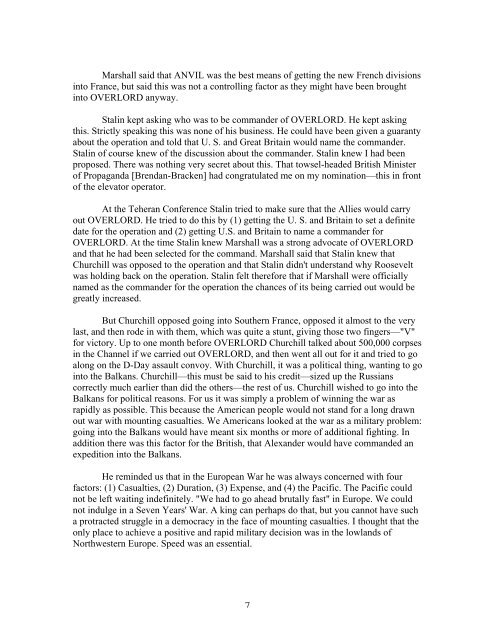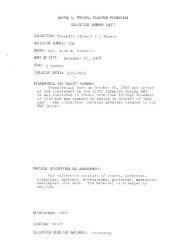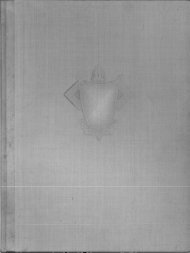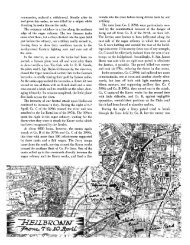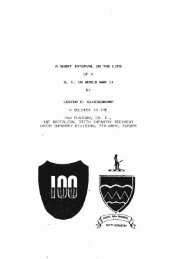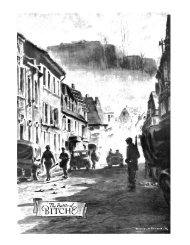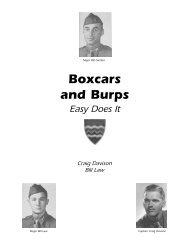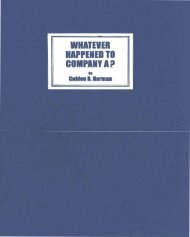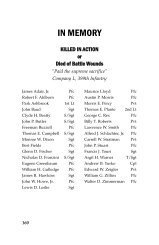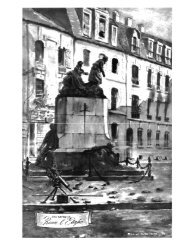July 25, 1949 - The George C. Marshall Foundation
July 25, 1949 - The George C. Marshall Foundation
July 25, 1949 - The George C. Marshall Foundation
You also want an ePaper? Increase the reach of your titles
YUMPU automatically turns print PDFs into web optimized ePapers that Google loves.
<strong>Marshall</strong> said that ANVIL was the best means of getting the new French divisions<br />
into France, but said this was not a controlling factor as they might have been brought<br />
into OVERLORD anyway.<br />
Stalin kept asking who was to be commander of OVERLORD. He kept asking<br />
this. Strictly speaking this was none of his business. He could have been given a guaranty<br />
about the operation and told that U. S. and Great Britain would name the commander.<br />
Stalin of course knew of the discussion about the commander. Stalin knew I had been<br />
proposed. <strong>The</strong>re was nothing very secret about this. That towsel-headed British Minister<br />
of Propaganda [Brendan-Bracken] had congratulated me on my nomination—this in front<br />
of the elevator operator.<br />
At the Teheran Conference Stalin tried to make sure that the Allies would carry<br />
out OVERLORD. He tried to do this by (1) getting the U. S. and Britain to set a definite<br />
date for the operation and (2) getting U.S. and Britain to name a commander for<br />
OVERLORD. At the time Stalin knew <strong>Marshall</strong> was a strong advocate of OVERLORD<br />
and that he had been selected for the command. <strong>Marshall</strong> said that Stalin knew that<br />
Churchill was opposed to the operation and that Stalin didn't understand why Roosevelt<br />
was holding back on the operation. Stalin felt therefore that if <strong>Marshall</strong> were officially<br />
named as the commander for the operation the chances of its being carried out would be<br />
greatly increased.<br />
But Churchill opposed going into Southern France, opposed it almost to the very<br />
last, and then rode in with them, which was quite a stunt, giving those two fingers—"V"<br />
for victory. Up to one month before OVERLORD Churchill talked about 500,000 corpses<br />
in the Channel if we carried out OVERLORD, and then went all out for it and tried to go<br />
along on the D-Day assault convoy. With Churchill, it was a political thing, wanting to go<br />
into the Balkans. Churchill—this must be said to his credit—sized up the Russians<br />
correctly much earlier than did the others—the rest of us. Churchill wished to go into the<br />
Balkans for political reasons. For us it was simply a problem of winning the war as<br />
rapidly as possible. This because the American people would not stand for a long drawn<br />
out war with mounting casualties. We Americans looked at the war as a military problem:<br />
going into the Balkans would have meant six months or more of additional fighting. In<br />
addition there was this factor for the British, that Alexander would have commanded an<br />
expedition into the Balkans.<br />
He reminded us that in the European War he was always concerned with four<br />
factors: (1) Casualties, (2) Duration, (3) Expense, and (4) the Pacific. <strong>The</strong> Pacific could<br />
not be left waiting indefinitely. "We had to go ahead brutally fast" in Europe. We could<br />
not indulge in a Seven Years' War. A king can perhaps do that, but you cannot have such<br />
a protracted struggle in a democracy in the face of mounting casualties. I thought that the<br />
only place to achieve a positive and rapid military decision was in the lowlands of<br />
Northwestern Europe. Speed was an essential.<br />
7


